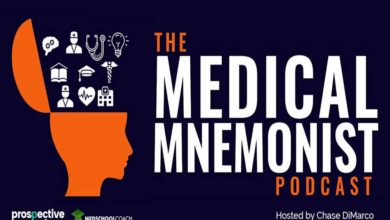Dr. Paulius Mui, a family medicine resident, discusses a medical card game he co-created, called Table Rounds, that helps students learn medical terms and topics.
- [02:25] Understanding Table Rounds and How You Can Benefit From it
- [06:31] Active Learning Through Gamification
- [11:07] Why Most Games Require Some Foundational Knowledge
- [12:58] The Future of Games in Medical Education
- [19:48] How Games Help in Group Study Settings
- [24:40] The Things Dr. Mui Could Change if He Could Go Back in Time
Chase DiMarco talks to Dr. Paulius Mui, a family medicine resident and co-founder of Table Rounds, a medical card game used in learning related medical terms and topics. They discuss how medical education is changing and why card games might be the right choice for you.
Gamification in Medical Education
The past couple of years have witnessed an increased number of medical students and practitioners embrace gamification as an alternative strategy to teach and learn medicine. This is primarily because the vast amounts of content learners need to consume demand unique learning strategies. Dr. Paulius Mui was inspired by his medical school days, where he and his friends used to link topics to probable causes and similar symptoms. Generally, their approach is somewhat similar to the real-world application of medicine. A patient gives you all these different clues, and it’s up to you to deduce what’s ailing them. Their game’s concept is that they take the pieces that may not be obvious to others and explain how they’re linked.
It’s a well-known fact that passive learning just doesn’t cut it anymore in the study of medicine. Active learning is often preferred, and the same applies in medical fields where practitioners work together in teams. Still, both these settings don’t allow room for making mistakes. Many of the standardized tests that you’ll go through follow a specific multiple-choice question with one correct answer. However, the real world does not have answers at the back of a book. And that’s where Table Rounds comes in. The game creates a safe space where people can be vulnerable with themselves and their peers to learn what they don’t know. The game simply takes you on a journey from meeting to treating a patient in an environment where it’s okay to be wrong.
Table Rounds
Most medical games are structured such that you’ll need to have a certain medical foundation to play them successfully. Yet, to play Table Rounds, you don’t need any notable medical background. The game is designed so that everyone, including people outside the world of medicine, can play. That said, you’ll probably enjoy more benefits if you’re in your 3rd or 4th year of study.
There are obviously several games that can potentially help you succeed in your medical journey. However, Dr. Mui believes that medicine’s future lies in students taking the initiative to create their own games. He also believes that the technological advancements being witnessed could empower students to tap into their creative sides and develop unique ideas that could be beneficial for the future generation of medics.
Group vs Independent Study in Med School
Most medical students prefer studying alone instead of being part of a group, and there is nothing wrong with that. If you believe that you’re more productive alone, then do what works for you. But, being knowledgeable or the best in your field is not enough when it comes to leadership. You’ll need to have individual soft skills such as communication or interpersonal skills that are often neglected in medical schools. Thus, if you have ambitions of one day becoming a leader, a group of people playing educational games is where you’ll best develop these skills.
Some schools have a culture where students miss certain lectures that they deem to be less critical. Dr. Mui attended almost every class, and that’s where he natured people skills that would later on in life create meaningful connections. While you might be more productive on your own, the significant relationships you build while in school will surely come in handy at some point in life.
Check out the previous Karl Knapp gamification episode. Join the Medical Mnemonist Master Mind Facebook group and find our Blog posts, Podcasts, and other Resources at FreeMedEd.org! Feel free to Email any Questions or Comments.
